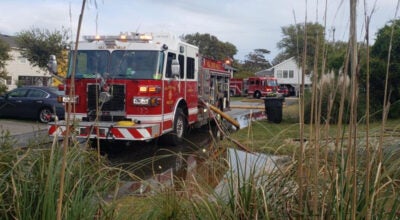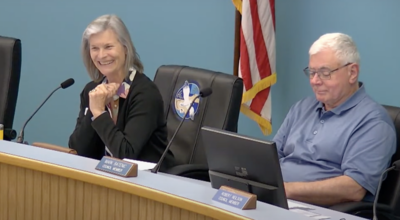Commissioners, school board members meet
Published 8:20 am Sunday, November 28, 2021
|
Getting your Trinity Audio player ready...
|
On Nov. 17, 2021, three Dare commissioners and three school board members grappled with educational issues of the day.
Robert L. Woodard, chairman of the county’s Board of Commissioners, opened the meeting with a list including critical race theory, masks and email responses from the board of education which didn’t meet his expectations.
Said Woodard, “this ain’t our fight.”
Meeting as the 5 on 5 Committee from the BOC were Woodard, Vice Chairman Wally Overman and commissioner Rob Ross. From the school board came Chair Mary Ellon Ballance, Vice Chair Margaret Lawler and board member Joe Tauber and observer Susan Bothwell.
Superintendent John Farrelly and county manager Robert L. Outten are members of the committee and were present for the over two hour meeting.
The finance directors from the county and school board were present, but this meeting was not about negotiating money matters.
Ross said false claims about critical race theory are out there. He asked “what is being taught and supported in Dare County Schools?”
Overman wanted to know if critical race theory was couched behind Social Emotional Learning.
Learning Loss is the Focus
Farrelly said the system is focused on learning loss and that’s what Dare’s COVID-19 funding is addressing. Dare County expects to receive $9 million in COVID-19 funding, 75% of which will be spent on teachers.
The system has hired an additional 23 teachers as “interventionists,” which are spread among the schools in the system. The interventionists only work on math and reading in small groups, said Farrelly. The program is in place for three years.
Of the $9 million, about $2 million has already been spent, said the superintendent.
Farrelly smoothed commissioners’ worries about absorbing the additional teachers. The teachers in the new positions will move over to vacant positions during the three years. No impact on the existing budget is expected.
Farrelly again said funding and mask mandates are not linked.
Social Emotional Learning
The state’s definition: “social and emotional learning (SEL) is an integral part of education and human development. SEL is the process through which all young people and adults acquire and apply the knowledge, skills, and attitudes to develop healthy identities, manage emotions and achieve personal and collective goals, feel and show empathy for others, establish and maintain supportive relationships, and make responsible and caring decisions.”
Farrelly said the Dare County Schools system “is not doing universal screening, is not engaged with Casel, is not engaged with Panorama.” Casel and Panorama are companies that the North Carolina Department of Public Instruction touted for Social Emotional Learning training and include universal screening.
Said Farrelly, “no one is running rogue.” He stated the system is “not collecting emotional data.”
No-Nonsense Nurturer®
The program presents teaching strategies, but Farrelly said there was blowback about training at First Flight Middle School. On Nov. 9, First Flight Middle Principal Diane Childress addressed the school board during public comment. She said the teacher training concentrated on four ways to improve teacher effectiveness: delivering explicit instructions, providing positive narration, promoting incentives or consequences and building relationships with students.
The nurturer program, which is offered by a company called CT3, aligns with the AVID program that has long been a program offered in Dare County Schools. The Non-Nonsense Nurturer program is been a success at First Flight Middle, which will continue to pilot the program this year. Success is realized with the reduced student office referrals.
Coffee with the Superintendent
Annually, Farrelly goes to each school in the system, schedules appointment with teachers and others and asks the question “what’s on your mind.”
Morale has been affected by the pandemic, by the board of education meetings and the difference in delivering remote and classroom instruction.
Teachers feel undervalued, underpaid, said the superintendent. “There’s a heavy load out there,” said Farrelly. He expressed concern about the system’s administrators.
Farrelly said some school districts are scheduling mental health days. Dare County Schools system has cut down required meetings.
The system has also gotten away from going to conferences for required training. Instead, the system has created its own training program called Ignite. The first session was held virtually; the second will be face-to-face. Numerous breakout sessions are provided by Dare County teachers.
Staffing Shortages
Farrelly said Dare School system is “in dire need of substitute teachers.”
Prior to the COVID-19 pandemic, the substitute pool numbered 250 people. The pool reached a low point at 120 substitutes. Today, the substitute pool numbers 150.
Applicants with a current or expired teaching license only need to fill out an application through Teacher/Match, include three professional references, attach the most recent license and authorize a background check. Once application is approved, a substitute teacher orientation session is scheduled.
Other applicants must complete an online effective substitute teacher training course with a cost of $29. Then instructions follow those for certified teachers, except instead of a license, a certificate of completion of the course is attached.
Farrelly mentioned looking into increasing substitute teacher pay. He said there is a national teacher shortage, but Dare County filled all its vacancies.
Books in School Libraries
Woodard asked who determines what books are in school libraries.
Farrelly immediately responded “librarians.”
And he added policy and procedures are in place. The policy number is 3200, which divides the category into textbooks and supplemental materials. State-approved textbooks are the primary means to help students meet goals and objectives. The school – through its school improvement plan – can select an alternative source.
“The selection of supplemental learning materials for school use is made at the school level with the collection and consideration of input from a variety of stakeholders. The stakeholders should include media specialists, teachers and instructional support personnel representing various subject areas and grade levels, as well as parents. Students also should be involved, when feasible and age appropriate,” states the policy.




